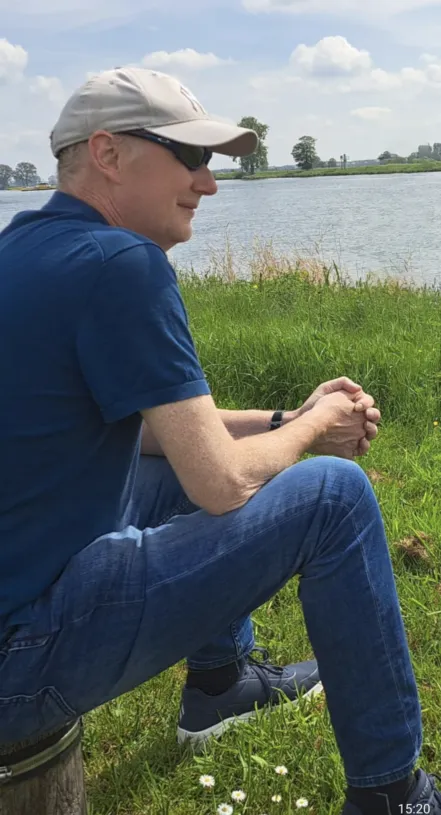'We were one of the first insurers for whom AWS drew up the compliance addendum'
"Onderlinge 's-Gravenhage stands for traditional and reliable," explains Ronnie de Bont, Chief Information Security Officer at the insurer. "But we were one of the first insurers in the Netherlands to move completely to the cloud. When COVID-19 struck and everyone had to work from home, we were able to carry on working as normal, whilst other companies initially had enormous problems with this."
This forward-thinking approach to technology has long characterised Onderlinge 's-Gravenhage (OG). The insurer from The Hague, with around 125 employees of whom 25 work in IT, made a leap in 2019 from its own data centre to a fully cloud-native environment on AWS. A move that was far from commonplace for financial institutions at the time - and which proved invaluable during the pandemic.

Forced choice becomes strategic opportunity
The cloud transformation actually began out of necessity. "We were previously based in a rather old, stately building in the centre of The Hague, very close to Noordeinde Palace," explains De Bont. "Behind my desk was a glass wall, and behind that, the servers were humming away."
When OG moved to a modern building in 2019, those familiar sounds disappeared. There was no room for its own data centre in the new premises, so the insurer began a project in 2018 to investigate alternatives. "One option was to rent data centre space in the Netherlands, where our own servers would simply be housed. Another option was to use Citrix to create a sort of virtual workplace. We also asked for help from major providers, but they couldn't manage that at the time."
Through careful evaluation with an external project manager, AWS emerged as the best option, not because of cost, but for the added value. "At that time, there was very much the idea that the cloud was mainly cheaper," says De Bont. "We had no such illusions. We already realised then that the cloud would probably always be somewhat more expensive, but you get so much in return. And that's what mattered to us."
Pioneer in financial compliance
For an insurer, the move to AWS brought specific challenges. The regulators, DNB (Dutch Central Bank) and the AFM (Netherlands Authority for the Financial Markets), impose strict requirements on the outsourcing of IT services - requirements that AWS wasn't yet fully prepared for at the time. "We were among the first," explains De Bont. "The Dutch Central Bank was also grappling with how all this should be arranged."
"Together we conducted a major risk assessment"
This is where inQdo's expertise proved invaluable. "Together we conducted a major risk assessment," says De Bont. A crucial point was audit capability: OG had to be able to guarantee that supervisors such as DNB could actually audit AWS itself to check how processes work. InQdo managed to raise this issue with AWS and discovered that a financial addendum was available. "We were actually the first to need that," says De Bont. "They more or less set that in motion for us, so that audit rights and other DNB requirements were clearly arranged."
That pioneering role continues. Recently, with the introduction of the Digital Operational Resilience Act (DORA) in Europe, De Bont took the initiative again. "I proactively contacted AWS about that," he says. "It turned out they had the required documentation, but weren't yet making it available as standard."
Knowledge transfer
The choice for a digital workplace based on Amazon WorkSpaces proved golden a year later. "That was fortunate," says De Bont. "When coronavirus struck and everyone had to work from home, we only had to say: go ahead and work from home. Technically, everything was already possible for us." Whilst other organisations got stuck, OG could continue working seamlessly. "Some colleagues with weaker health didn't come to the office for three years. Now we have a hybrid policy."
The collaboration with inQdo changed character as OG built up more AWS knowledge. "In the beginning, we relied heavily on inQdo for knowledge. You can see that we now rely less and less on inQdo because we increasingly have that knowledge in-house through our employees' experience."
"In the beginning, we relied heavily on inQdo for knowledge. You can see that we now rely less and less on inQdo because we increasingly have that knowledge in-house through our employees' experience."
That knowledge transfer happened organically. "We received training on the job. Initially, someone from inQdo came twice a week to whom we could ask questions. That became once a week and later once a fortnight. Meanwhile, we still have half-hour stand-up meetings that we regularly cancel, because we simply don't have any questions." The personal approach from inQdo makes the difference for De Bont. "With a large provider, you can't even reach the account manager, because nobody knows who that is. With inQdo, I can ring the director directly if necessary, and then something happens immediately."
Layered security with Trend Micro
Alongside AWS optimisation, inQdo also advised on additional security measures. "AWS has a shared responsibility model," explains De Bont. "They arrange a lot, but we as customers are also responsible for certain matters."
On inQdo's advice, OG switched to Trend Micro for security monitoring. This choice was logical because Trend Micro is specially optimised to work together with AWS environments. "Trend Micro monitors all servers and workspaces within our AWS environment. If something strange happens - for example, if I log in from Delft and ten minutes later from North Korea - an alarm goes off immediately."
The system offers 24/7 monitoring and proactive protection. "If it seems urgent, we're even called during the night. Moreover, Trend Micro also provides virtual patches when new vulnerabilities are discovered, until we've installed the real patch."
Significant cost advantages through optimisation
Although cost savings were not the main objective, the cloud migration did deliver considerable financial benefits. The most concrete example: Oracle licences. Previously, we paid Oracle about €80,000 per year. Now we pay about €25,000 per year for license-included Oracle via AWS RDS - a saving of more than two-thirds." The flexibility of the cloud makes that saving possible. "The development environment switches off at seven in the evening and comes back on at seven in the morning. We don't have to pay for the Oracle licence during those twelve hours."
InQdo helped with the cost-efficient setup of the environment. "They helped us with scripts that allow us to switch servers on and off automatically. They also pointed us towards reserved instances - if you buy servers in advance from AWS, you get a 20 to 30 per cent discount. And we no longer have to buy a new server park every four years, which could easily cost €200,000."
For De Bont, the real value lies not in cost saving, but in peace of mind. "I don't want to think about having to arrange for a fire suppression system near my servers and having to buy new servers every few years because they're outdated again. Of course, you pay something for it, but AWS provides not only availability but also security, both physical and digital. These are things I no longer have to arrange or worry about."
"It probably couldn't have been much earlier but if only we'd done this years earlier"
From lift-and-shift to cloud-native development
The collaboration evolved from migration to optimisation. Initially, it was lift-and-shift - we actually only used AWS as a data centre. Since about a year ago, we've also been building websites with truly AWS-native tooling."
For the coming years, modernisation of legacy systems is central. Whether that means everything will run cloud-native on AWS or that a SaaS solution will be chosen remains to be seen. What is certain is that the cloud transformation has given OG the flexibility to face the future with confidence. "It probably couldn't have been much earlier, I think," smiles De Bont, "but: 'if only we'd done this years earlier'."


